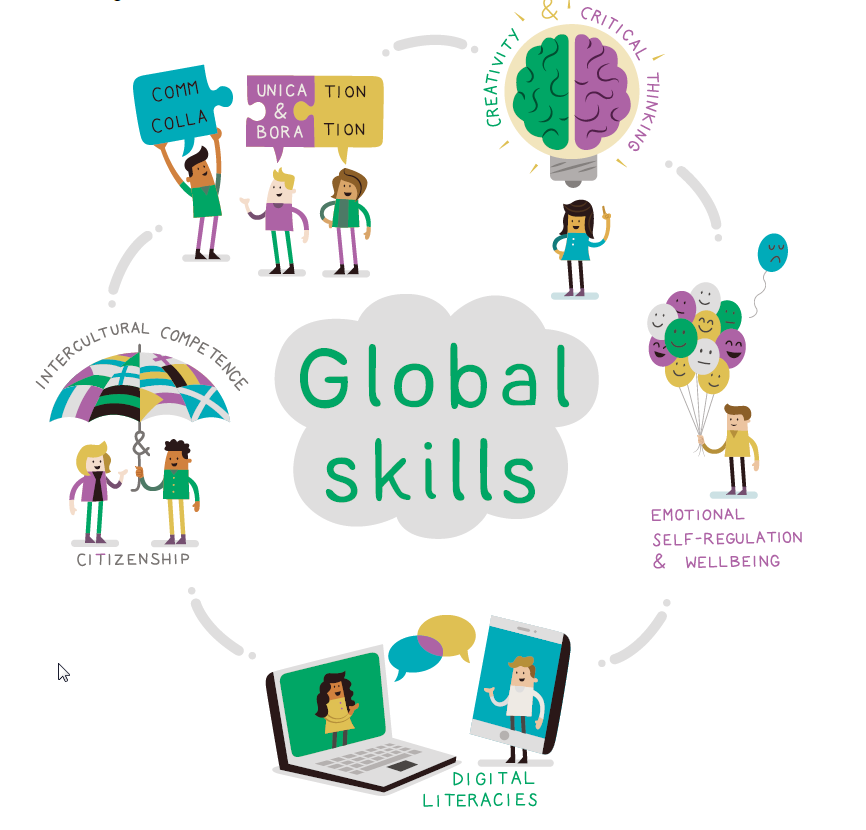 A changing world
A changing world
To varying degrees, we’re all experiencing the advances of a more globalized and open world. We view images on social media that transport us to places we didn’t know existed, our children are adroit at video chatting with their grandparents, and we increasingly work with colleagues of different backgrounds across the globe. This paints a picture of great opportunities, where choice and open-mindedness bring together the best of our globalized technological societies. At the same time, it highlights challenges and responsibilities. For example the need for a deeper understanding of empathy and inclusivity, sustainability, and striving to remain relevant.
“Our task is to educate [students’] whole being so they can face the future. We may not see the future, but they will, and our job is to help them make something of it.”
Sir Ken Robinson
Governments across the world are evaluating this changing landscape, recognizing that education needs to cover more than traditional subject knowledge whilst trying to pinpoint the skills and attitudes that will secure employability potential for the next generation. Alongside redefining the future labour market, the realities at the start of this new decade draw attention to less economically-driven societal values. Emotional resilience and wellbeing are swiftly climbing up social and political agendas, recognized as defining factors of happiness and personal success.
How can we truly prepare for the future?

At Oxford University Press, we recently concluded work on identifying the global skills needed to thrive in the 21st-century world. We focused on the language classroom as it’s a natural conduit for developing global attitudes and skills through the lens of a different language, new culture, and communicative teaching methodologies. The global skills were grouped into five interconnected clusters and mapped onto the language classroom context. We acknowledged that this environment creates opportunities for authentic collaboration and reasons for meaningful communication, inspires creativity alongside multi-faceted critical thinking. The language classroom encourages positive learner identity and invites active participation in a wider world, reflected in the emotional self-regulation and wellbeing cluster, and the intercultural competence and citizenship cluster of skills. Digital and data literacies completed the list as a key enabler that encompasses and facilitates the other clusters.
Can global skills really be taught and learned?
The resounding answer is yes! Learning global skills is a realistic proposition for all learners. What’s more, evidence suggests that these skills are transferable across and beyond the curriculum, and support a positive attitude to lifelong learning.
What governments can do to support their development is to pro-actively mobilize global skills in educational policies that reflect local contexts. This can be achieved through curriculum development, teacher and institutional buy-in, and a sustainable implementation model that includes less orthodox assessment solutions. After all, what government wouldn’t like to see engaged thinkers, confident and resourceful individuals who embrace an ethos of lifelong learning? What government wouldn’t like the next generation to grow into competent, fulfilled, healthy, empathetic and active participants in their communities? This is what the teaching of global skills can offer our learners – not tomorrow, but today.
For expert advice on how you can bring global skills into your classroom today, including an exclusive Teachers’ Toolkit, download our position paper today!
Yordanka Kavalova is the publisher for Professional Development at OUP ELT. She’s worked in education publishing for over 13 years and has led a number of international projects for schools and higher-education. Yordanka also heads up the Expert Panel initiative at OUP ELT and is the chair of the ELT Journal. Previous to that, she was a corpus linguistics researcher at University College London and holds an MPhil in Modern English.


[…] to become globally competitive talents and we leave no deserving Filipino […]